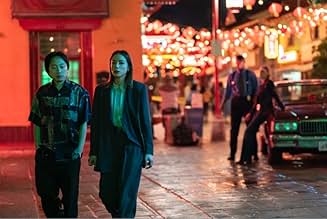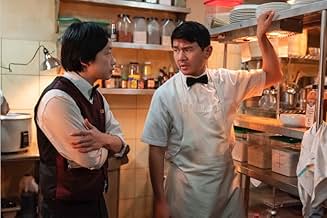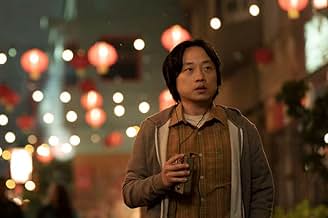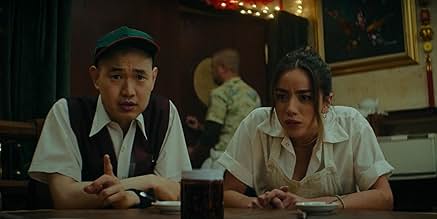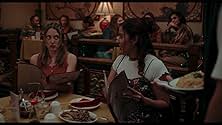Interior Chinatown
- Miniserie de TV
- 2024
- Apta para mayores
- 45min
La historia de un actor asiático-americano que lucha contra los estereotipos y los papeles estereotipados, tanto en el trabajo como en su vida personal.La historia de un actor asiático-americano que lucha contra los estereotipos y los papeles estereotipados, tanto en el trabajo como en su vida personal.La historia de un actor asiático-americano que lucha contra los estereotipos y los papeles estereotipados, tanto en el trabajo como en su vida personal.
- Premios
- 1 premio y 1 nominación en total
Explorar episodios
7,05.4K
1
2
3
4
5
6
7
8
9
10
Reseñas destacadas
Pretty good and unique! Still watching..
Really happy to see Chloe Bennet again! Which is why I'm watching this. She is so awesome and gorgeous! She has such a great onscreen presence and charisma that really shows in her acting, and the roles she takes.
I've enjoyed all the episodes so far. I'm on episode 8 and it's gots its faults, but whatever, I'm sure I'll enjoy the rest of it.
I like the different atmosphere this show brings. The comedy from each of the characters has definitely pulled me in. It's a little wonky, and you're trying to figure what's really going on, but in a good, unique way.
Really hope for success with the show, with more seasons to come.
I've enjoyed all the episodes so far. I'm on episode 8 and it's gots its faults, but whatever, I'm sure I'll enjoy the rest of it.
I like the different atmosphere this show brings. The comedy from each of the characters has definitely pulled me in. It's a little wonky, and you're trying to figure what's really going on, but in a good, unique way.
Really hope for success with the show, with more seasons to come.
Takes trust but it's worth it.
A show that's actually unique and unpredictable. Glad one of my favorite critics said you have to trust the strange angles, beats and that many of the multiple questions will have payoff come in time. The first episode and a half are a bit of a struggle but with the whole season finished I'm glad they didn't feed us a lot of answers.
Funny, in a non-typical way but also in terms of real punchlines. Pretty well directed satire and some real good commentary on social issues, American contradictions and minorities being neglected as well as overtly mistreated. I don't feel like they forced the social commentary in there and it really is just a central part of the unorthodox flow. Really excited to see where they take it!
Any fans of non-formulaic stories, good acting, good comedy and strangeness should try. Just give it more than two episodes.
Funny, in a non-typical way but also in terms of real punchlines. Pretty well directed satire and some real good commentary on social issues, American contradictions and minorities being neglected as well as overtly mistreated. I don't feel like they forced the social commentary in there and it really is just a central part of the unorthodox flow. Really excited to see where they take it!
Any fans of non-formulaic stories, good acting, good comedy and strangeness should try. Just give it more than two episodes.
Definitely exceeds all expectations if you have a brain
I'm not saying you have to be super intelligent to follow and enjoy this offbeat spectacular production but what I do believe though for inquisitive people searching for twists that add up and not the run of the mill entertainment there's proble no chance you wouldn't enjoy "Interior Chinatown". This being about my 250th review I've only given a 9 or higher about 35 times throughout my decade of reviews on IMDB which to me says a lot in it's self. If your unaware of the Hollywood era in TV/ Movies we currently are closing out of it's the Multiple dimensions era but what's so fascinating about this show it truly succeeded blending reality and the alternative so uniquely by squarely showing our inner anxieties, life regrets and persinal failures or ambitions so clear without pause you have no choice but to get fully swept into such a funny far out intricately woven story that turns out to be one of the truest tales ever told.. Highmarks all around Acting, Directing, Set design and casting but a super chef's kiss to the teleplay screenwriters for this outstanding idea perfectly fleshed out. BRAVO.
Interior Chinatown: A Sharp Satire That Challenges Stereotypes and Forces Self-Reflection
Interior Chinatown is a brilliant yet understated reflection of the world-a mirror that exposes how society often judges people by their covers. The show captures this poignantly with the scene where Willis Wu can't get into the police precinct until he proves his worth by delivering food. It's a powerful metaphor: sometimes, if you don't fit the mold, you have to prove your value in the most degrading or unexpected ways just to get a foot in the door. The locked precinct doors represent barriers faced by those who don't match the "majority's" idea of what's acceptable or valuable.
While the series centers on the Asian and Pacific Islander (API) community and the stereotypical roles Hollywood has long relegated them to-background extras, kung fu fighters-it forces viewers to confront bigger questions. It makes you ask: Am I complicit in perpetuating these stereotypes? Am I limiting others-or even myself-by what I assume is their worth? It's not just about API representation; it's about how society as a whole undervalues anyone who doesn't fit neatly into its preferred narrative.
The show can feel confusing if you don't grasp its satirical lens upfront. But for me, knowing the context of Charles Yu's original book helped it click. The production team does an incredible job balancing satire with sincerity, blurring the line between real life and the exaggerated Hollywood "procedural" format. They cleverly use contrasting visuals and distinct camera work to draw you into different headspaces-Hollywood's glossy expectations versus the grittier reality of life.
Chloe Bennet's involvement (real name Chloe Wang) ties into the show's themes on a deeply personal level. She famously changed her last name to navigate Hollywood, caught in the impossible middle ground of not being "Asian enough" or "white enough" for casting directors. It's a decision that sparks debate-was it an act of survival, assimilation, or betrayal? But for Bennett, it was about carving a space for herself to pursue her dreams.
This theme echoes in one of the show's most poignant scenes, where Lana is told, "You will never completely understand. You're mixed." It's a crushing acknowledgment of the barriers that persist, even when you're trying to bridge divides. Lana's story highlights how identity can be both a strength and an obstacle, and the line serves as a painful reminder of the walls society creates-externally and internally.
Interior Chinatown doesn't just ask us to look at the system; it forces us to examine ourselves. Whether it's Willis Wu at the precinct door or Lana trying to connect in a world that sees her as neither this nor that, the show unflinchingly portrays the struggle to belong. And as viewers, it challenges us to question our role in those struggles: Are we helping to dismantle the barriers, or are we quietly reinforcing them?
While the series centers on the Asian and Pacific Islander (API) community and the stereotypical roles Hollywood has long relegated them to-background extras, kung fu fighters-it forces viewers to confront bigger questions. It makes you ask: Am I complicit in perpetuating these stereotypes? Am I limiting others-or even myself-by what I assume is their worth? It's not just about API representation; it's about how society as a whole undervalues anyone who doesn't fit neatly into its preferred narrative.
The show can feel confusing if you don't grasp its satirical lens upfront. But for me, knowing the context of Charles Yu's original book helped it click. The production team does an incredible job balancing satire with sincerity, blurring the line between real life and the exaggerated Hollywood "procedural" format. They cleverly use contrasting visuals and distinct camera work to draw you into different headspaces-Hollywood's glossy expectations versus the grittier reality of life.
Chloe Bennet's involvement (real name Chloe Wang) ties into the show's themes on a deeply personal level. She famously changed her last name to navigate Hollywood, caught in the impossible middle ground of not being "Asian enough" or "white enough" for casting directors. It's a decision that sparks debate-was it an act of survival, assimilation, or betrayal? But for Bennett, it was about carving a space for herself to pursue her dreams.
This theme echoes in one of the show's most poignant scenes, where Lana is told, "You will never completely understand. You're mixed." It's a crushing acknowledgment of the barriers that persist, even when you're trying to bridge divides. Lana's story highlights how identity can be both a strength and an obstacle, and the line serves as a painful reminder of the walls society creates-externally and internally.
Interior Chinatown doesn't just ask us to look at the system; it forces us to examine ourselves. Whether it's Willis Wu at the precinct door or Lana trying to connect in a world that sees her as neither this nor that, the show unflinchingly portrays the struggle to belong. And as viewers, it challenges us to question our role in those struggles: Are we helping to dismantle the barriers, or are we quietly reinforcing them?
An addictive surreal show
I understand the original book was a reaction to the author's perception that East Asian characters on TV were flat and generic. That message translates to this show but is definitely not preachy or woke. In fact there's a lot of humour.
Although Willis Wu is the principal character, I think a lot of the entertainment values come from the supporting ensemble.
Green and Turner, the uber-stereotyped buddy cops who started to question whether crimes were solving themselves. Willis parents given depth as a later life crisis couple mourning the death of Willis older brother.
The tricks ( no spoiler) Willis uses to penetrate the precinct station were hilarious. Ditto the fun poked at police forensics as they appear on TV.
All round a good show.
Although Willis Wu is the principal character, I think a lot of the entertainment values come from the supporting ensemble.
Green and Turner, the uber-stereotyped buddy cops who started to question whether crimes were solving themselves. Willis parents given depth as a later life crisis couple mourning the death of Willis older brother.
The tricks ( no spoiler) Willis uses to penetrate the precinct station were hilarious. Ditto the fun poked at police forensics as they appear on TV.
All round a good show.
¿Sabías que...?
- CuriosidadesEarly in the series, Willis (Jimmy O. Yang), Fatty (Ronny Chieng), and Carl (Chau Long) see Detective Lana Lee (Chloe Bennet) on TV and debate her possible ethnicity: Carl declares, "she looks Thai," while Fatty argues, "Dude, she's clearly Korean. Know your Asians." In fact, Bennet is the child of a white mother and a Chinese father. Earlier in her acting career she changed her last name from Wang to Bennet (her father's first name) after encountering casting agents who said they were unable to cast her as Asian or Asian American characters, but her name precluded her consideration for white characters either.
Selecciones populares
Inicia sesión para calificar y añadir a tu lista para recibir recomendaciones personalizadas
- How many seasons does Interior Chinatown have?Con tecnología de Alexa
Detalles
- Fecha de lanzamiento
- País de origen
- Sitio oficial
- Idioma
- Títulos en diferentes países
- 內景唐人街
- Localizaciones del rodaje
- Empresas productoras
- Ver más compañías en los créditos en IMDbPro
- Duración
- 45min
- Color
- Mezcla de sonido
- Relación de aspecto
- 16:9 HD
Contribuir a esta página
Sugerir un cambio o añadir el contenido que falta





